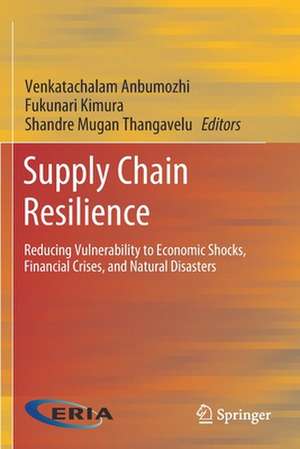Supply Chain Resilience: Reducing Vulnerability to Economic Shocks, Financial Crises, and Natural Disasters
Editat de Venkatachalam Anbumozhi, Fukunari Kimura, Shandre Mugan Thangaveluen Limba Engleză Paperback – 23 mai 2021
Typically, supply chain risk assessments focus on normative guidelines based on single best practice examples or vulnerability events, and there has been little work exploring how the concepts of supply chain risk management and resilience are related. However, since this relationship has implications for developing integrated response strategies, a clear understanding of the possible consequences is a fundamental step in building socio-economic resilience along the supply chain.
Against this background, the book addresses three main topics: firstly, it defines the conceptual and sectoral domains of supply chain risk management and resilience by examining the welfare effects of extreme weather events and other economic shocks on selected global supply chains. It then presents an in-depth analysis of the scope of public–private partnerships to tackle the risks, by empirically exploring supply chain risk effects and information management. Thirdly, it proposes a regional cooperation framework in the context of major supply chain vulnerability events such as disasters and global financial crises.
| Toate formatele și edițiile | Preț | Express |
|---|---|---|
| Paperback (1) | 1112.12 lei 6-8 săpt. | |
| Springer Nature Singapore – 23 mai 2021 | 1112.12 lei 6-8 săpt. | |
| Hardback (1) | 1117.50 lei 6-8 săpt. | |
| Springer Nature Singapore – 23 mai 2020 | 1117.50 lei 6-8 săpt. |
Preț: 1112.12 lei
Preț vechi: 1356.24 lei
-18% Nou
Puncte Express: 1668
Preț estimativ în valută:
212.79€ • 222.20$ • 175.72£
212.79€ • 222.20$ • 175.72£
Carte tipărită la comandă
Livrare economică 15-29 aprilie
Preluare comenzi: 021 569.72.76
Specificații
ISBN-13: 9789811528729
ISBN-10: 9811528721
Ilustrații: VIII, 340 p. 136 illus., 121 illus. in color.
Dimensiuni: 155 x 235 mm
Greutate: 0.54 kg
Ediția:1st ed. 2020
Editura: Springer Nature Singapore
Colecția Springer
Locul publicării:Singapore, Singapore
ISBN-10: 9811528721
Ilustrații: VIII, 340 p. 136 illus., 121 illus. in color.
Dimensiuni: 155 x 235 mm
Greutate: 0.54 kg
Ediția:1st ed. 2020
Editura: Springer Nature Singapore
Colecția Springer
Locul publicării:Singapore, Singapore
Cuprins
Chapter 1: Economic shocks and uncertainties: how does firm innovativeness enable supply chain and moderate interdependence?.- Chapter 2: Supply chain resilience in the global financial crisis: an empirical study on Japan.- Chapter 3: How do production networks affect the resilience of firms to economic and natural disasters: a methodological approach and assessment in Taiwan?.- Chapter 4: Economic risk characteristics of an Indonesian value chain and identifying sources of uncertainty in policy making.- Chapter 5: Robustness of production networks against economic disasters: Thailand case.- Chapter 6: Complexities in supply chain resilience against economic shocks and forming public private partnerships: Korean automotive case.- Chapter 7: A contingent resource-based perspective of tourism value chain and robustness: European experiences.- Chapter 8: Assessing the competitive advantage of public policy support for supply chain resilience.- Chapter 9: Achieving the resilience of production networks: the role of procurement and public polices during economic crisis.- Chapter 10: Stranded assets and protecting value of food value chain from disasters and other external shocks.
Notă biografică
Venkatachalam Anbumozhi is a Senior Economist at the Economic Research Institute for ASEAN and East Asia (ERIA), Indonesia. He has published widely on natural resource management, climate-friendly infrastructure design, and private sector participation in green growth. He was invited as a member of the APEC Expert Panel on Green Climate Finance and the ASEAN Panel for promoting climate-resilient growth. He has taught courses on resource management, international cooperation, and development finance.
Fukunari Kimura has been a Professor at the Faculty of Economics, Keio University, Tokyo, Japan since 2000 and Chief Economist at the Economic Research Institute for ASEAN and East Asia (ERIA) since 2008. His major research interest is in international trade and development economics. In particular, he has recently been active in writing on international production networks and economic integration in East Asia.
Shandremugan Thangavelu is Associate Professor and Regional Director (Southeast Asia) at the Centre for International Economic Studies, Institute of International Trade at the University of Adelaide, Australia. He is an active researcher on human capital development, technology transfer, foreign direct investment, trade, government infrastructure investment, productivity and economic growth.
Fukunari Kimura has been a Professor at the Faculty of Economics, Keio University, Tokyo, Japan since 2000 and Chief Economist at the Economic Research Institute for ASEAN and East Asia (ERIA) since 2008. His major research interest is in international trade and development economics. In particular, he has recently been active in writing on international production networks and economic integration in East Asia.
Shandremugan Thangavelu is Associate Professor and Regional Director (Southeast Asia) at the Centre for International Economic Studies, Institute of International Trade at the University of Adelaide, Australia. He is an active researcher on human capital development, technology transfer, foreign direct investment, trade, government infrastructure investment, productivity and economic growth.
Caracteristici
Offers both academic insights and practical guidance on the nature of compound disasters and the efficacy of measures that could improve resilience along global value chains
Provides a detailed analysis on the typology of shocks and the early warning systems necessary to mitigate them
Sheds light on the causal relationships in supply chain risk management
Provides a detailed analysis on the typology of shocks and the early warning systems necessary to mitigate them
Sheds light on the causal relationships in supply chain risk management
